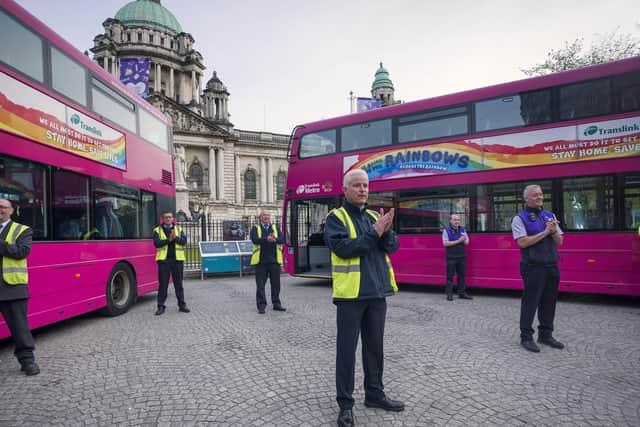Alex Kane: When crisis has passed how will we treat NHS?


I was thinking about that question the other day when I was relaxing in my hammock (lockdown has brought out the Pimm’s-sipping bohemian in me) and reading a mixture of social media discussions and newspaper articles. The general consensus was that many of us had decided not to take things for granted anymore, to be much more grateful for what we have, to spend more time with loved ones and not to waste precious time on petty squabbles and point-scoring disputes.
There was also a general consensus that, as a nation, we should be particularly grateful for the efforts of those on the ‘frontline,’ especially those in the NHS and broader caring services. Millions have stood on their doorsteps every Thursday evening to ‘clap for our heroes’ and let them know that they are treasured for their devotion to duty and willingness to take risks and make sacrifices for the rest of us.
Advertisement
Hide AdAdvertisement
Hide AdI mentioned in last week’s column about the political, electoral, societal ‘reckoning’ which would follow the end of the crisis. Part of that reckoning will be a reassessment of the NHS. Will those millions who’ve been clapping for the past few weeks and singing the praises of the staff be prepared to dig deep into their pockets to rebuild and refinance the NHS? Boris Johnson spoke of the ‘human shield’ which the people of the UK had put around the NHS since the crisis began, so will he be prepared to raise tax to make up for what has been a chronic underfunding of the NHS for years?


If lockdown isn’t loosened fairly soon will people still accept the ‘stay at home’ regulations, part of which are built on the argument that we need to take pressure off the NHS and its staff? How long will it be before increasing numbers express the view that the protection of the NHS and its staff can’t continue to take precedence over their right to leave their homes and return to ‘normal’ life?
The other problem is that the economy has already taken a massive hit and will continue to be running well below par for at least a couple of years – maybe longer, depending on the discovery and rolling out of a vaccine. There will be a rise in unemployment and many businesses will be struggling for some time to get back on their feet again. The chancellor of the exchequer will have to find huge sums of money to regenerate and refuel the economy.
So, imagine the government asking the tax-payer to either accept a rise in taxes for the NHS, or accept that the government row back on other spending commitments and channel that money to the NHS. And all of this against a background of the government having to pay back the growing debt it has incurred during the crisis. Bear in mind, too, that, as it stands (although things may change on this front), the UK will be facing the quite separate political and economic challenges of life outside the European Union in eight months.
Advertisement
Hide AdAdvertisement
Hide AdAll of this would suggest that the demands of the NHS may be placed on the back-burner again. There will probably be some sort of national ‘celebration’ at some point to thank all the staff and hand out all sorts of awards; yet I suspect that the rebuilding and refinancing required to resolve the problems which have beset it for decades will come in the form of a long-term promissory note.
Which is a little bit ironic. The NHS grew out of the demand for political/societal change at the end of the Second World War (although it had its roots in the ‘homes for heroes’ language at the end of the First World War) and those structures have been subject to what sometimes looked like purely random, seen-to-be-doing-something change and overhaul ever since, particularly from the mid-1970s.
If ever there were a time to take a long, hard look at the NHS and the role it plays in our everyday lives, then this is that time. It would be the height of hypocrisy to cheer it for weeks on end from millions of doorsteps (including Downing Street, the homes of MPs and members of the Royal Family) and then shrug our collective shoulders when we think the crisis has passed and fudge the moment to press ahead with the necessary changes – structural and financial.
Yet, I think that’s exactly what we will do. Clapping is easy. Texting a few quid to ‘Captain Tom’ is easy. Texting another few quid to the Children in Need/Comic Relief ‘big night in’ is easy. Sending a bunch of flowers and a box of chocolates to a nurse who lives in the same street, is easy. Getting the children to paint a rainbow and place it on the front window is easy. Posting millions of ‘we love you’ messages on social media platforms is easy. But how many of us doing all of that would take the same ‘no problem’ approach if asked to pay extra tax to rebuild the NHS? How many would vote for a party which included the extra tax pledge in its manifesto?
Advertisement
Hide AdAdvertisement
Hide AdThat’s what I meant when I asked if one of the consequences of this crisis would be a difference in how we ‘do’ politics: would there be a new consensus that the NHS was too big, too important, too central to our lives, to be left to the mercy of competing manifestoes at every election? Or, when the clapping stops and the fund-raising TV events move on to other issues, will the NHS just be left to muddle along and make do as best it can?
—— ——
A message from the Editor:
Thank you for reading this story on our website. While I have your attention, I also have an important request to make of you.
With the coronavirus lockdown having a major impact on many of our advertisers - and consequently the revenue we receive - we are more reliant than ever on you taking out a digital subscription.
Subscribe to newsletter.co.uk and enjoy unlimited access to the best Northern Ireland and UK news and information online and on our app. With a digital subscription, you can read more than 5 articles, see fewer ads, enjoy faster load times, and get access to exclusive newsletters and content. Visit https://www.newsletter.co.uk/subscriptions now to sign up.
Advertisement
Hide AdAdvertisement
Hide AdOur journalism costs money and we rely on advertising, print and digital revenues to help to support them. By supporting us, we are able to support you in providing trusted, fact-checked content for this website.
Alistair Bushe
Editor